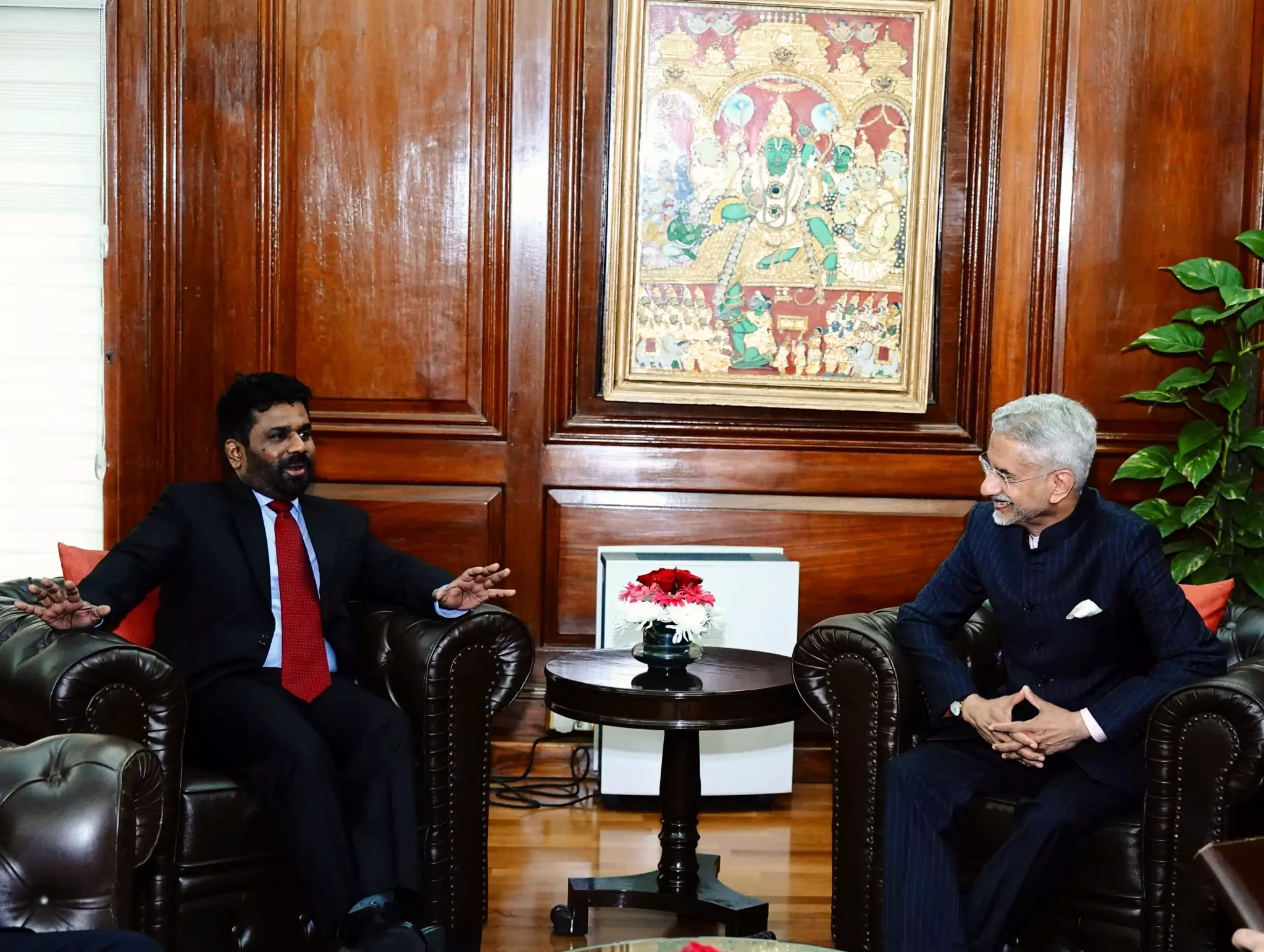
India's External Affairs Minister S Jaishankar met JVP/NPP's leader Anura Kumara Dissanayake in New Delhi on February 5. Photo: X | @DrSJaishankar
Sri Lanka's anti-India party assures it won’t act against New Delhi’s strategic interests
The visit to New Delhi by a delegation of the National People’s Power (NPP) was amid growing sentiments within and outside Sri Lanka that the JVP/NPP could be catapulted to power in Colombo.

For long the most anti-India force in Sri Lankan politics, the leftwing Janatha Vimukti Peramuna (JVP) has assured the Indian government that it will not act against India’s strategic interests if and when it gets to rule the island nation.
The promise was given to key members of the Indian leadership by a delegation of the National People’s Power (NPP) alliance, in which the JVP is the dominant player, during a widely-discussed five-day visit to India at New Delhi’s invitation that ended on February 10.
The visit to New Delhi, Gujarat, and Kerala was led by JVP/NPP leader Anura Kumara Dissanayake and included senior NPP MP Vijitha Herath, Nihal Abbeysinghe, and Anil Jayantha, all of them drawn from the majority Sinhalese community, the JVP’s power base.
JVP entered mainstream politics in 1994
The JVP, which led two violent insurrections to seize power in Sri Lanka in 1971 and 1988-89 that claimed tens of thousands of lives, entered mainstream politics in 1994 after giving up the politics of violence. It has enjoyed high support in much of Sri Lanka since playing a leading role in the mass anti-government protests over a failed economy that led to the 2022 ouster of then- president Gotabaya Rajapaksa.
Recent surveys of voter sentiment in Sri Lanka say the NPP, which Dissanayake formed in 2015 as an alliance of the JVP and 27 smaller parties and groups, leads in popularity among political parties while Dissanayake enjoys more than 50 per cent of popularity among those tipped to battle for the powerful post of presidency.
Sri Lanka is expected to hold presidential and general elections this year.
JVP/NPP could be catapulted to power
Dissanayake has been circumspect about the discussions in India besides saying that the visit was amid growing sentiments within and outside Sri Lanka that the JVP/NPP could be catapulted to power in Colombo.
“People anticipate a turnaround in local politics in the presidential election,” Dissanayake said on his return to Colombo. “This visit was important as Sri Lanka cannot remain isolated in the world.”
He added that honouring an official invite from New Delhi “doesn’t mean we should change our political and economic policies”.
His colleague Herath was more forthcoming, saying regional security formed an important aspect of the discussions in New Delhi with National Security Adviser Ajit Doval and External Affairs Minister S Jaishankar.
“We assured our Indian counterparts that we are committed to safeguarding regional security while upholding our nation’s sovereignty,” said Herath.
NPP's assurance to Doval
An informed Sri Lankan source, however, said that in the context of growing rivalry between India and China vis-à-vis Sri Lanka and because of the JVP’s known political links with Beijing, the delegation made it clear to Doval, in particular, that the NPP would not act against India’s strategic interests.
“There was no ambiguity in what the JVP and NPP told the Indian government,” said the source. “We could see the Indians were happy with what they heard.”
The source added that it was also conveyed to the Indian side that the JVP and NPP have politically evolved in as much as New Delhi’s position on various issues, including those related to Sri Lanka, have also changed over the years.
The JVP/NPP delegation also met India’s foreign secretary, attended a meeting arranged by the Vivekananda International Institute in New Delhi, and visited various facilities in Gujarat and Kerala.
JVP’s history
The JVP was founded in 1965 by the Moscow-educated Rohana Wijeweera, who went on to lead a bloody insurrection in 1971 that was put down by Sri Lanka, leaving thousands of people dead. After years of lying low, the JVP led another insurrection in 1988-89, mainly capitalising on the anti-India mood in the country in the wake of the 1987 India-Sri Lanka accord under which Indian troops were deployed in the island’s northeastern province.
Sri Lanka crushed the second JVP insurrection in an equally bloody manner. Its founder Wijeweera was shot dead in November 1989 in circumstances that are still in dispute.
Ever since its birth, the JVP has been consistently anti-India. One of the five lessons taught to all JVP cadres was on “Indian expansionism”. Even in recent years, the JVP has repeatedly accused India of trying to lord over Sri Lanka and of interfering in the country’s affairs, particularly on the Tamil question.
The JVP and NPP have also protested against Indian economic investments.
All this has mostly confined the JVP’s appeal among the majority Sinhalese community. It has not been able to attract sizeable sections of Tamils as well as members of the Tami-speaking Muslim community.
Changing rhetoric in recent times
But the JVP and NPP have been changing their rhetoric in recent times, realising that the old times are gone and the new has to be viewed with a fresh perspective. In this new world order, India is seen as a friend of Sri Lanka and Indian investments would be welcome as long as the decision-making process is transparent and Indian knowledge and technology helps Sri Lanka to have a part of the prosperity cake.

